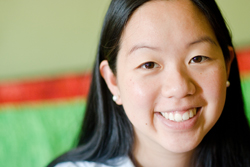Taking the Law in Her Own Hands
For most of the students in the TC Summer Principals Academy, the assignment to design a proposal for a new school is basically an exercise in setting priorities - a chance to briefly live the fantasy all educators have of full control over their environment and to answer the question: In an ideal world, what would I really try to achieve?
For Mariela Graham, however, the experience turned out to be a revelation. “One of the things we talked a lot about in SPA was leadership style—how some people would fit best turning around a failing school, while others would be strongest maintaining a high-functioning institution. I realized that what I could do best was plan a school from scratch.”
Of course, opportunities to start new schools don’t come along every day, especially when you’re 27 years old with just five years of teaching under your belt. But Graham, a bilingual Duke University graduate who emigrated to the U.S. from Peru when she was a little girl, is not your typical 27-year-old. Slight and not much older-looking than many of her future students, she is nevertheless formidably organized and has a resume that already includes teaching three different subjects at two different schools—including one for Latin American immigrant children whose educations have been interrupted—mentoring first-year teachers, serving as a sixth grade team leader and running an after-school program to prepare students taking New York City’s entrance exam for specialized small high schools. She’s also a new mom.
Fate seemed to be calling, then, when Graham learned in November 2006 that the Urban Assembly needed a last-minute replacement to run its as-yet-unscripted School for Criminal Justice—an all-girl, combined middle-and-high school that was scheduled to open in fall 2007. Whoever was chosen would need to complete the new schools application and ultimately determine how best to use the theme of criminal investigation as the basis for shaping the institution and its curriculum.
“I had to take a deep breath and ask myself if this was really something I could throw my heart into,” Graham recalls. “I loved that the school was going to be all girls, and that it would have a chance to reach students as early as in the sixth grade. But I wasn’t sure at first about the theme. The Urban Assembly didn’t want a school that trained girls to be police officers, and I certainly agreed with that, but they did want an acknowledgement of the post-9/11 world of crime and terrorism, and I wasn’t sure about that slant.”
Graham’s 50-page proposal, which won her the job, could serve as model for other small “theme” schools in New York and nationwide that are struggling with how to fulfill their various themes in meaningful ways. So could the school’s planning team, which included teachers, university professors, parents and students. The focus that has emerged is, by her own description, a “balancing act” that, on one level, honors the idea of criminal investigation on a literal level while also using it in the service of a far broader aim: teaching students high-level analytical skills that will enable them to get into top colleges and win demanding “knowledge-sector” jobs.
“Let’s remember that kids are going to be choosing this school when they’re eleven, and while criminal investigation may sound like a cool career then, they may want to do something entirely different by the time they’re seventeen,” she says. “So I’ve interpreted the idea of criminal investigation as a metaphor for the use of logic and evidence in supporting ideas. To convict anyone of a crime, there always has to be evidence, like on ‘Law & Order’—and it’s the same in an English class. If you say, ‘this character represents Jesus,’ you’ve got to have a logical presentation of that, using evidence from the text.”
Students will be allowed one elective each year that truly does relate directly to law and crime, but even here, the goal will be to build classic academic skills. For sixth graders, it might be a “crime in the news” course in which they hone their understanding of current events and their ability to read non-fiction texts—a skill that many colleges find lacking in new arrivals.
“Think of the stories that ran in every paper when Saddam Hussein was executed,” Graham says. “Kids all knew it was happening, but if you asked them to say something substantive about who he was and why he was being executed and why it was important, most had no idea.”
In the upper grades, electives will fall into one of three subject areas—forensic science (which Graham sees as an opportunity to build math and science skills and confidence among girls); criminology, focusing on the sociological aspects of crime; and law and justice, which will explore the legal system. All are being developed and taught in collaboration with several university partners.
As the school prepares to begin sharing space on July 1 with Montauk Junior High School in Borough Park, Brooklyn, there is a sense that Graham, too, is finally coming home.
“Originally, I wanted a career in education policy,” she says. “To do that, I thought I ought to have experience teaching first. Then I thought that being a principal would be a good path to learning more about New York City’s Board of Education. I’m still interested in policy, but this whole experience has changed things for me. Now, I feel that the most exciting part of working in education is being right there in the school building.”
Published Friday, Jun. 15, 2007
